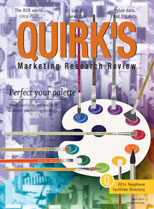Editor's note: This article appeared in the April 7, 2014, edition of Quirk's e-newsletter.
It's fitting, isn't it, that an article about being more conversational in your research would stimulate one of the most lively online conversations we've seen recently here at Quirk's Marketing Research Media? This is precisely the case with Peanut Labs' Annie Pettit's article, titled "Forget gamification; try writing a humanized survey," in Quirk's February 10, 2014, e-newsletter.
As the world we live in becomes more informal by the minute, Pettit's article walks readers through a research-on-research report on a test of traditional vs. more-conversational styles of survey-question wording. The research was conducted with a non-branded survey about computer- and video-gaming opinions and behaviors that was first written using traditional survey wording and style and then copied into a second version where about 90 percent of the questions were rewritten with a more casual and humanized approach. Pettit looks at overall respondent engagement and satisfaction and the incidence of data-quality issues, such as too-short open-ends, straightlining, speeding and acquiescing.
Perhaps not surprisingly, respondents showed a slight preference for the humanized version and it yielded as-good-or-better data than the traditional model. Some enthusiastic Quirk's readers were happy to chip in their two cents via the Disqus commenting platform.
Here are a few highlights from the online discussion. Feel free to click through and share your thoughts as well! (No need to create a new account if you don't want to; you can sign in via Facebook, Twitter or Google+.)
"I try to sneak humanized questions onto surveys until I get the disapproving stink-eye from my superiors. However, I will persevere in my quest!" - Robert
"This is the worst advice on questionnaire design I have ever seen . . . unless the aim is to make respondents cringe." - John
"Glad to make YOU cringe. The only way we can improve what we do is to spin it on its head once in a while. Doing things the same way we've always done them is never a recipe for success." - Annie Pettit
"Surely, some survey participants will cringe (as John suggests) at a 'humanized' version, while others will enjoy and embrace it. But who'll hate it and who'll love it? Does your data reveal any insights into the role of demographics, in terms of dropouts and ratings (traditional vs. humanized)? E.g., the most obvious: Is there an age skew? (Thinking the young are less receptive to the standard survey lingo while more susceptible to the conversational approach)." - Dan Kvistbo
"I like to think that a good survey is akin to a conversation, while a poor one resembles an uncomfortable interrogation. Thanks for reminding us that researchers should be able to engage their audience in a pleasant conversation." - Larry Kilbourne
"Face to face, there are a thousand different interviewer styles out there - personally I think most of them will have no trouble with a more friendly wording style, though there will be the occasional vociferous objection. I was told at an early stage to use my common sense but my common sense is working harder now than it ever has before. I'm literally having to translate questions into plain English as I read them out loud, make jokes and carry and coach the respondent along through awful repetitive situations. But this should all be structured and ironed out at the authoring stage so that inexperienced interviewers can deliver quality results." - alan851603
"Respondent receptivity is one thing; client acceptance of the informal version is quite another!" - gk
"I work in a B2B marketing research group and we have a very difficult time breaking out of our boring - yet grammatically proper - questionnaires. Your article will inspire us to try something new." - Nicole Newton
